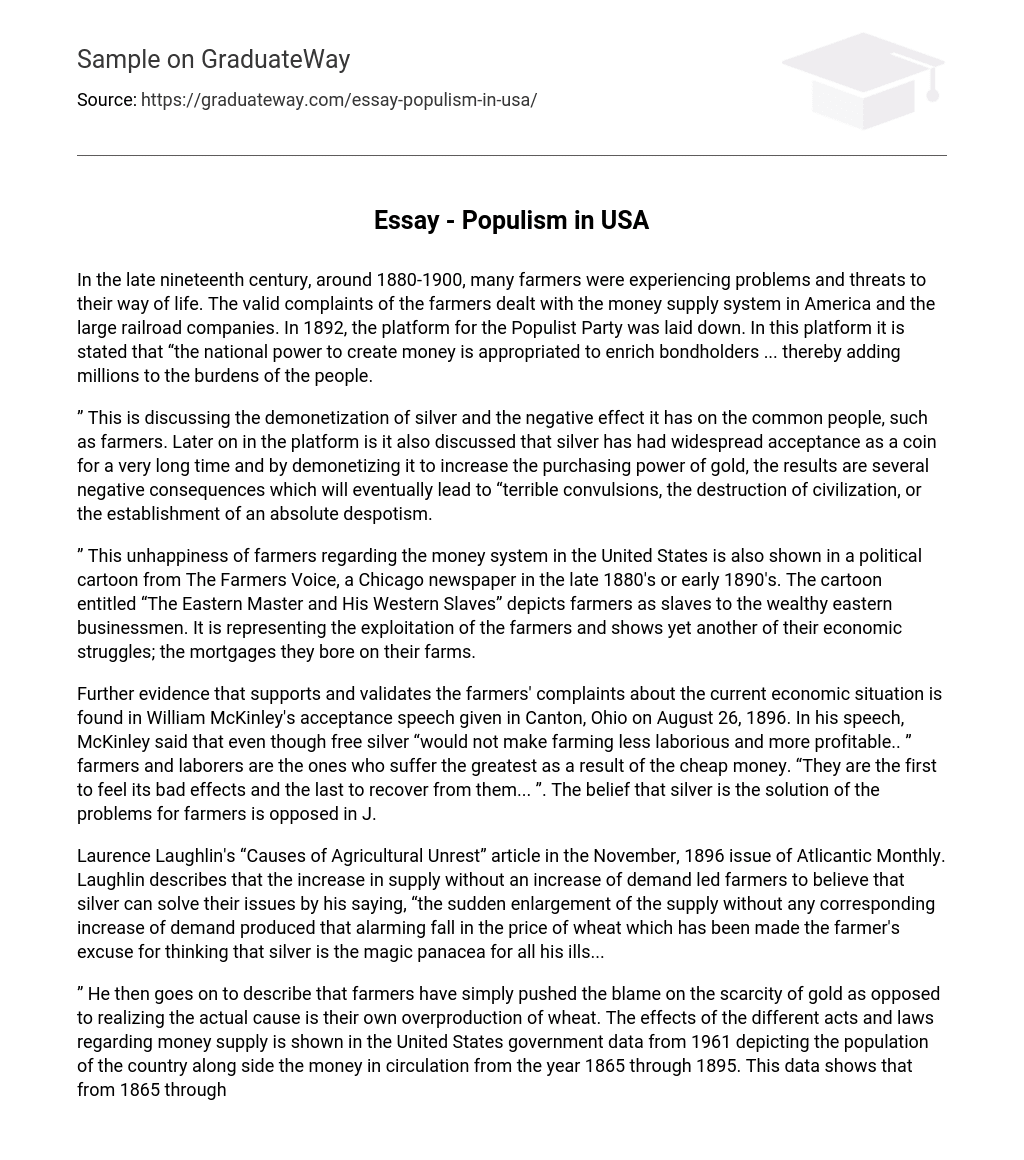During the late nineteenth century, specifically between 1880 and 1900, numerous farmers were facing difficulties and challenges that posed a threat to their livelihood. These challenges primarily involved two aspects: the monetary system in America and the influential railroad companies. In 1892, the Populist Party established its platform, which highlighted concerns regarding the appropriation of national monetary creation rights for the purpose of benefiting bondholders. Consequently, this action placed additional burdens on the general public, thereby exacerbating their hardships.
“This section addresses the demonetization of silver and its detrimental impact on ordinary individuals, particularly farmers. Furthermore, the passage highlights how silver has been widely accepted as a coin for an extended period. However, by demonetizing silver to enhance the buying power of gold, numerous negative outcomes arise. Ultimately, these circumstances may eventually lead to dire consequences such as severe disruptions, the collapse of civilization, or the emergence of an oppressive rule.”
“The Eastern Master and His Western Slaves” is a political cartoon from The Farmers Voice, a Chicago newspaper in the late 1880’s or early 1890’s. This cartoon reveals the discontent of farmers towards the monetary system in the United States. It portrays farmers as slaves to rich businessmen from the East, representing the exploitation they faced. Furthermore, it highlights one of their economic challenges – the burdensome mortgages on their farms.
Further evidence supporting and validating the complaints of farmers regarding the current economic situation can be found in William McKinley’s acceptance speech at Canton, Ohio on August 26, 1896. McKinley acknowledged that while free silver would not alleviate the laborious nature of farming or make it more profitable, it is the farmers and laborers who bear the brunt of the negative consequences of cheap money. They feel these effects first and recover from them last. The opposition to the belief that silver is the solution to farmers’ problems is presented in J.
In his article “Causes of Agricultural Unrest” published in the November 1896 issue of Atlantic Monthly, Laurence Laughlin discusses how farmers believe that silver can solve their issues. He explains that the increase in supply without a corresponding increase in demand has led to a significant fall in the price of wheat, which farmers consider a reason for believing in the magical healing powers of silver and its ability to solve all their problems.
“He then goes on to describe that farmers have simply pushed the blame on the scarcity of gold as opposed to realizing the actual cause is their own overproduction of wheat. The effects of the different acts and laws regarding money supply is shown in the United States government data from 1961 depicting the population of the country alongside the money in circulation from the year 1865 through 1895. This data shows that from 1865 through 1885, the population was increasing, however, the amount of money in circulation was decreasing rapidly.
This implies that the acts and laws pertaining to money were causing the currency to deflate. The argument against the railroad companies is considered valid due to the government’s evident bias towards big businesses, despite the railroads having a monopoly. Another expression of dissatisfaction towards monopolies can be found in James B’s work called A Call to Action: An Interpretation of the Great Uprising. Its Source and Causes.
Weaver, a Populist candidate for president in the election of 1892, expressed his belief that trusts and monopolies employ various unethical tactics to harm the producer, including threats, intimidation, bribery, fraud, wreck, and pillage. These actions result in the impoverishment of the producer, their forced reliance on a single market, reduced wages for all workers in the industry, widespread unemployment, and ultimately an increase in prices for consumers.
In the late nineteenth century, the farmers and laborers encountered two primary challenges: insufficient money supply and the dominance of big corporations, particularly railroads. As a result, they expressed numerous concerns, which were indeed legitimate given the evidence provided earlier. The farmers faced difficulties in making ends meet with their meager profits and were additionally burdened by the actions of monopolies and railroad enterprises that further reduced their earnings.





